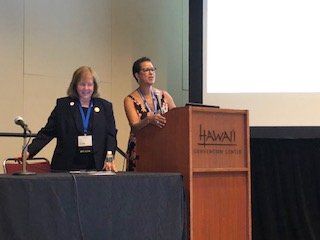A Wayne State University pediatrician played a critical role in developing a national policy statement that recognizes for the first time the impact racism has on the health of American children and teens.
Lynn Smitherman, M.D., FAAP, assistant professor of WSU Pediatrics, is a member of the American Academy

of Pediatrics’ Task Force Addressing Bias and Discrimination. The task force’s work contributed to the policy statement, “The Impact of Racism on Child and Adolescent Health,” issued by the AAP on July 29.
The statement is a call for action by the nation’s pediatricians to reduce the impact of racism and improve the health of American children. The AAP believes that racism has a significant impact on children’s health. The academy says that pediatricians must play a part in improving the health condition of children through listening to families, creating “culturally safe medical homes” and by becoming advocates for social justice in their communities.
“Eliminating discrimination, racism and bias in the care of our most valuable resource, our children, is a basic tenet to any civil society. Participating in the AAP’s Task Force on Addressing Bias and Discrimination in the care of children was one of the many highlights of my professional career,” said Dr. Smitherman, who also chairs the National Medical Association’s Pediatric Section and is the vice chair of Medical Education for the WSU Department of Pediatrics. “Any activity to bring people together and heal the divides of this country are critically important to the well-being and health of the society in general. I was very proud that the AAP took this important position and that I, as a WSU faculty member, was able to contribute.”
“Eliminating discrimination, racism and bias in the care of our most valuable resource, our children, is a basic tenet to any civil society. Participating in the AAP’s Task Force on Addressing Bias and Discrimination in the care of children was one of the many highlights of my professional career,” said Dr. Smitherman, who also chairs the National Medical Association’s Pediatric Section. “Any activity to bring people together and heal the divides of this country are critically important to the well-being and health of the society in general. I was very proud that the AAP took this important position and that I, as a WSU faculty member, was able to contribute.”
Joseph Wright, M.D., M.P.H., chair of the AAP Task Force on Addressing Bias and Discrimination, and senior vice president and chief medical officer at the University of Maryland Capital Region Health, noted that the policy statement is the first of its kind to incorporate the word “racism” in its title.
“Without calling out and identifying racism directly at institutional and organizational levels, we certainly won’t be able to deal with it appropriately in professional, interpersonal and practice settings,” he said in an address to the AAP’s 67,000 members.
According to the AAP, a growing body of research has found that racism harms children’s mental and physical health. Children and teens who are targets of racism are impacted the most, but bystanders are also harmed. Studies have found that young adults who were bystanders to racism as a child experienced physiological and psychological effects when asked to recall the event – similar to the effects experienced by first-responders after disasters. Research has also examined the impact of racism on specific health measures, such as pre-term birth, low birth weight and mental health. The stress of being the victim of racism can cause physical reactions that can lead to long-term health problems like diabetes, heart disease and depression.
The policy stipulates that racism is a social determinant of health that has a profound impact on the health status of children, adolescents, emerging adults and their families, and that the failure to address racism will “continue to undermine health equity for all children.” Pediatricians, the report states, should be at the forefront of addressing racism as a core social determinant of health.
Despite some programs that have seen improvements in the health of children, the report noted, African-American, Hispanic and American Indian children continue to contend with health stressors such as comparatively higher rates of parental unemployment and significantly lower household net wealth, which are barriers to opportunities and services that optimize health.
The statement calls on pediatricians to: ensure that all patients and families are welcomed in their practices and that they will be treated with mutual respect; create “culturally-safe” medical homes in which physicians and staff are sensitive to the racism that children and families experience; assess patients for stressors and social determinants of health associated with racism; and assess patients who report experiencing racism for mental health conditions, including signs of post-traumatic stress, anxiety, grief and depression.
In terms of advocacy, pediatricians should lobby community leaders: to develop safe playgrounds and healthy food markets to reduce disparities in obesity and undernutrition; for higher quality education in segregated communities; to implement federal and local policies that lead to implicit-bias training in schools and “robust” training of educators in culturally competent classroom management; to increase access to mental health resources in schools; to implement multicultural and multilingual school curriculum that are reflective of their communities; to advance social justice policies; and to advocate for fair housing practices and access to housing loans that prohibit the practice of redlining.
Pediatricians must also advocate for funding of rigorous research that studies the impact of discrimination on child and family health outcomes, the impact of policy changes and community-level interventions in reducing the health effects of racism on children and teens, and integration of the human genome to identify biomarkers that can be used to improve human health, “rather than continue to classify people on the basis of their minor genetic differences and countries of origin.”